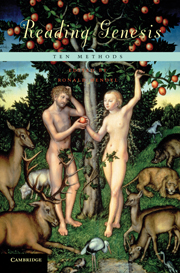Book contents
- Frontmatter
- Contents
- Contributors
- Acknowledgments
- Reading Genesis
- Introduction
- 1 Literature
- 2 Cultural Memory
- 3 Sources and Redaction
- 4 Gender and Sexuality
- 5 Inner-Biblical Interpretation
- 6 Rabbinic Interpretation
- 7 Interpretation in the Early Church
- 8 Translation
- 9 Modern Literature
- 10 Modern Theology
- Index of Biblical Citations
- General Index
- References
9 - Modern Literature
Published online by Cambridge University Press: 05 June 2012
- Frontmatter
- Contents
- Contributors
- Acknowledgments
- Reading Genesis
- Introduction
- 1 Literature
- 2 Cultural Memory
- 3 Sources and Redaction
- 4 Gender and Sexuality
- 5 Inner-Biblical Interpretation
- 6 Rabbinic Interpretation
- 7 Interpretation in the Early Church
- 8 Translation
- 9 Modern Literature
- 10 Modern Theology
- Index of Biblical Citations
- General Index
- References
Summary
Generations of readers have thought of Genesis through Milton's Paradise Lost, Goethe's Faust, Melville's Moby-Dick, Kafka's parables, Mann's Joseph and His Brothers, Atwood's The Handmaid's Tale, Shalev's Esau, and Morrison's Paradise; yet, literary exegesis has rarely been seen as an integral part of the exegetical history of this founding text. Whereas traditional Judeo–Christian commentary (whether the Midrash or St. Bernard's sermons) and biblical scholarship have held prominent positions in the exegetical canon, literature has been regarded – more often than not – as a separate realm, admirable in its aesthetic power but irrelevant for textual analysis, providing no guidance to deciphering the unformulated meanings and complex links of scriptural texts. Against such mappings of exegesis, I argue that the poetic license of writers does not make their exegetical reflections less earnest or pertinent. Quite the contrary: literary flights of the imagination – despite and, at times, because of their radical departures from the Bible – may entail interpretive insights available to no other exegetical mode. I would go so far as to suggest that the hermeneutic projects of writers are vital to the understanding of Genesis as well as to the exploration of its cultural roles in diverse historical settings.
Genesis is one of the key texts of literary exegesis. The possibility of touching on the beginning of all beginnings – of following the pivotal, primary questions about creation, humanity, language, culture, and life itself – is something few literary exegetes chose to ignore. Of the many writers who have sought to reinvent Genesis, I focus on Melville's Moby-Dick, a momentous landmark in the history of the literary reception of the text. To be sure, Melville wanted no less than to reinvent the Bible as a whole – indeed, Moby-Dick has acquired the status of a Bible of sorts in American culture and beyond – but Genesis is one of the privileged texts in his grand exegetical voyage through libraries and oceans.
- Type
- Chapter
- Information
- Reading GenesisTen Methods, pp. 176 - 195Publisher: Cambridge University PressPrint publication year: 2010



